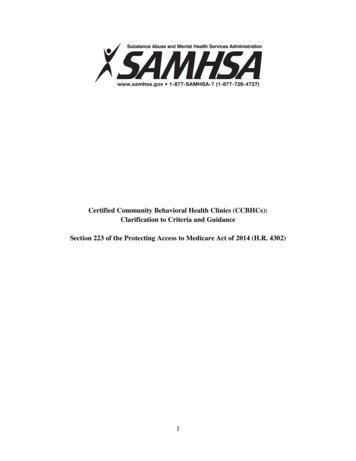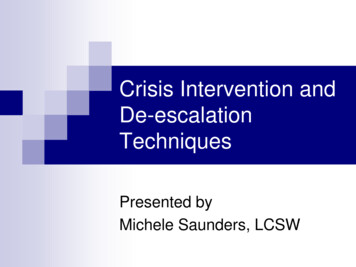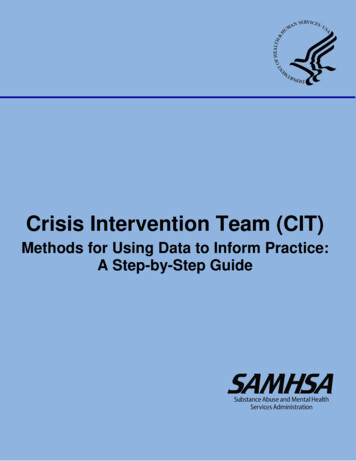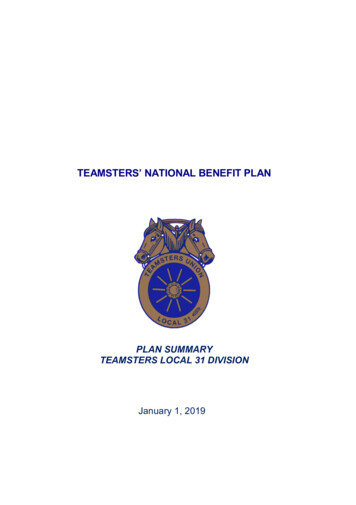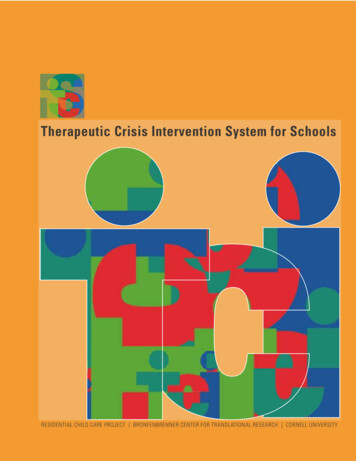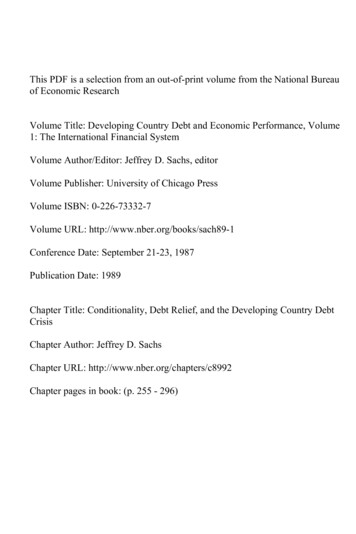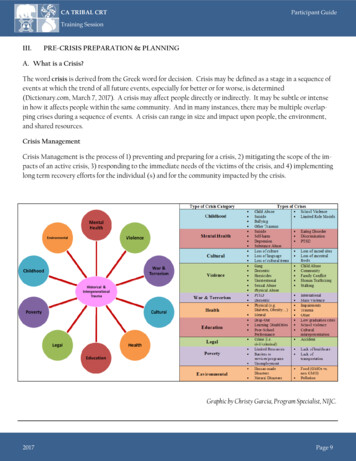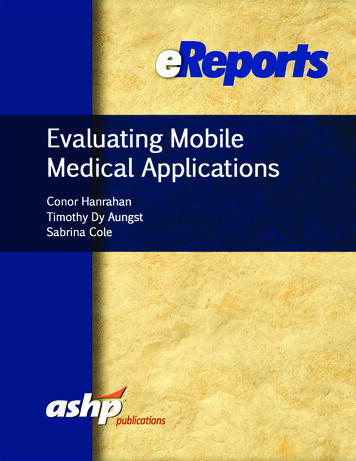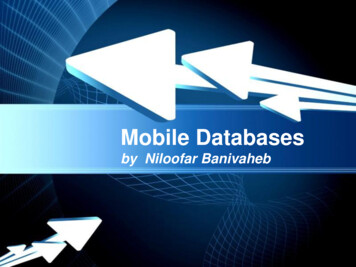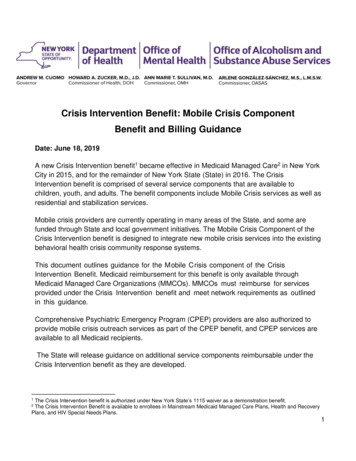
Transcription
Crisis Intervention Benefit: Mobile Crisis ComponentBenefit and Billing GuidanceDate: June 18, 2019A new Crisis Intervention benefit1 became effective in Medicaid Managed Care2 in New YorkCity in 2015, and for the remainder of New York State (State) in 2016. The CrisisIntervention benefit is comprised of several service components that are available tochildren, youth, and adults. The benefit components include Mobile Crisis services as well asresidential and stabilization services.Mobile crisis providers are currently operating in many areas of the State, and some arefunded through State and local government initiatives. The Mobile Crisis Component of theCrisis Intervention benefit is designed to integrate new mobile crisis services into the existingbehavioral health crisis community response systems.This document outlines guidance for the Mobile C risis component of the CrisisIntervention Benefit. Medicaid reimbursement for this benefit is only available throughMedicaid Managed Care Organizations (MMCOs). MMCOs must reimburse for servicesprovided under the Crisis Intervention benefit and meet network requirements as outlinedin this guidance.Comprehensive Psychiatric Emergency Program (CPEP) providers are also authorized toprovide mobile crisis outreach services as part of the CPEP benefit, and CPEP services areavailable to all Medicaid recipients.The State will release guidance on additional service components reimbursable under theCrisis Intervention benefit as they are developed.The Crisis Intervention benefit is authorized under New York State’s 1115 waiver as a demonstration benefit.The Crisis Intervention Benefit is available to enrollees in Mainstream Medicaid Managed Care Plans, Health and RecoveryPlans, and HIV Special Needs Plans.121
This document is organized into the following four sections:I.II.III.IV.I.Overview: Mobile Crisis Component of the Crisis Intervention Benefit;Definitions;Mobile Crisis Service and Provider Standards; andRates and Billing Requirements.Overview: Mobile Crisis Component of the Crisis Intervention BenefitThe Mobile Crisis component of the Crisis Intervention Benefit includes the followingservices and corresponding activities. Each service is eligible for reimbursementseparately when delivered in accordance with this guidance. Telephonic triage and crisis response;Mobile crisis response;Telephonic crisis follow-up; andMobile crisis follow-up.The goals of these services are engagement, symptom reduction, and stabilization. Theseservices can be provided to an adult or child who appears to be experiencing, or is atimminent risk of experiencing, a behavioral health (psychiatric and/or substance use) crisis.These services are designed to interrupt and/or ameliorate a crisis by: II.Providing services in the community where the individual is experiencing a crisis;Assessing the immediate crisis and facilitating resolution and de-escalation;Assisting the individual to use community and family/support systems with the intentof preventing the reoccurrence of similar events in the future;Engaging the individual to identify follow-up services and assist the individual toaccess these services that are necessary to manage and/or prevent furtherbehavioral health crisis experiences; andEngaging with the individuals’ caretaker and /or family members when appropriate.Definitions1. Behavioral Health CrisisA. Behavioral Health CrisisA Behavioral Health (BH) crisis is an unplanned event that requires a rapid response. ABH crisis includes instances in which a person cannot manage their primarily psychiatricand/or substance use related symptoms without de-escalation or intervention. A BH crisis2
may also be defined as a situation in which an individual’s experience with daily lifechallenges has resulted in, or puts them at risk of, an escalation in psychiatric and/orsubstance use symptoms.B. Behavioral Health Crisis InterventionBehavioral Health Crisis intervention is defined as an activity which uses therapeuticcommunication, interactions and supporting resources to interrupt and/or ameliorateacute BH distress and associated behaviors.C. Behavioral Health Crisis Intervention Service: Qualifying EpisodeA qualifying BH crisis intervention episode begins with the provider’s initial contact withthe individual. The end of the crisis episode is defined by the amelioration of theindividual’s presenting symptoms or, if clinically indicated, when the person is transferredto the recommended level of care.2. Mobile and Telephonic Behavioral Health Crisis Service ComponentsThe Crisis Intervention Benefit includes the following mobile and telephonicresponse service components:A. Telephonic Crisis Triage and ResponseUpon contact by the individual or referent, a provider will answer the call to determine theappropriate service response to the crisis. Referents may include families, providers,crisis hotlines, 911 operators, law enforcement or other sources, depending on whatresources are available in the locality. Telephonic crisis triage and response coveragemust be available 24 hours a day, 7 days a week and 365 days a year. A provider canonly bill for telephonic crisis triage and response if they provide this service to anindividual enrolled in Medicaid Managed Care or a collateral.Telephonic crisis triage response includes a preliminary assessment to determine theneed for further evaluation, and to make treatment recommendations and/or referral toother health and/or behavioral health services as clinically indicated. The expectation isthat the assessment includes, but may not be limited to: Risk of harm to self or others, current mental status, current and recent history ofsubstance use, assessment of intoxication and potential for serious withdrawal;History of psychiatric treatment and medical stability;Prescribed medications, including medical, psychiatric and medication assisted3
treatments for substance use;Presenting problem and review of immediate needs; andIdentification of supports.If crisis triage indicates the need for further evaluation and/or crisis response, thetelephonic crisis response may include: Therapeutic communication and interaction to alleviate psychiatric or substance usesymptoms;Development of a safety plan or crisis prevention plan;Referral and linkage to appropriate behavioral health community services as analternative to more restrictive levels of care; andFacilitating timely access to services required to address the crisis related needs ofthe individual, including mobile crisis response, stabilization, withdrawal andstabilization service, respite, or psychiatric or substance use disorder (SUD) inpatienthospitalization.B. Mobile Crisis ResponseMobile crisis teams are dispatched to an individual’s home or any community settingwhere a crisis may be occurring, to provide brief intervention and facilitate access toother crisis/behavioral health services. They provide appropriate care and support whileavoiding unnecessary law enforcement involvement, emergency department use andhospitalization. However, mobile crisis response may include co-response with local lawenforcement, if possible, given local arrangements.Mobile crisis response may include: 3Initial assessment and ongoing assessment of behavioral health symptoms andcrisis related needs;Involvement of identified family and friends to resolve the individual’s crisis;Therapeutic communication and interaction to alleviate psychiatric or substance usesymptoms;Development of a safety plan or crisis prevention plan;Psychiatric consultation and urgent psychopharmacology intervention;Referral and linkage to appropriate behavioral health community services as analternative to more restrictive levels of care, including crisis respite;Linkage to stabilization and/or local SUD such as 24/7 open access centers3;Regional services can be identified at: m4
Secure access to higher levels of care if required; andCertified Peer services, including:o Engagement;o Assistance with developing crisis diversion plans or relapse prevention plans; ando Assistance with the identification of natural supports and access to communityservices during and after a crisis.C. Mobile and Telephonic Follow-Up ServicesMobile Crisis service providers may bill MMCOs for mobile and telephonic follow-upservices provided to a recipient of a qualifying crisis service. Follow-up services are4eligible for reimbursement if provided within 14 days of the qualifying crisis episode .Follow-up services may be delivered face-to-face or through telephonic contact and mayinclude, but are not limited to, the following types of activities: III.Therapeutic communication and interactions to maintain stabilization following acrisis episode and prevent escalation of BH symptoms;Facilitation of engagement in outpatient BH services, care coordination, medicalhealth or basic needs related to the original crisis service;Confirmation with service providers of connections to care and support to therecipient in the community while he or she is awaiting initiation or resumption ofservices;Contact with the individual’s existing primary care and BH treatment providers, adultor children’s Single Point of Access (SPOA) where applicable, and and/or carecoordinator of the developed crisis plan;Contact with the individual’s natural support network with consent;Referral and engagement/re-engagement with health homes and appropriate BHcommunity and certified peer services to avoid more restrictive levels of treatment,including crisis respite; andFollow-up with the individual and the individual’s family/support network to confirmenrollment in care coordination, outpatient treatment, or other community serviceshas occurred or is scheduled.Mobile Crisis Service and Provider Standards1. Service Standards 4Services will be person-centered, trauma informed, and culturally and linguisticallySee definition section for definition of qualifying crisis episode.5
competent;Mobile and Telephonic Crisis Response Services will be available 24 hours per day,seven days per week, and 365 days per year;Mobile Crisis Response will provide an in-person intervention within 3 hours of thedetermination of need;5Services will be provided upon the individual’s presentation for the service, eitherface-to-face or telephonically;6Depending on local conditions, Mobile and Telephonic Crisis Response Servicesshould be integrated with local emergency systems (e.g., 911, local crisis hotlines)and law enforcement, up to and including co-response, to be able to provide thesafest and best-coordinated crisis response;With the individual’s permission and whenever possible, contact should be madewith family members, adult or children’s SPOA where applicable, and/or othercollaterals with pertinent information to inform the assessment. Follow-up activitiesand efforts to enroll the individual and/or family/caregiver to supports and/or serviceswill be documented; andOnly Mobile Crisis service providers approved by the State will be eligible to billMedicaid Managed Care using this benefit7. See ‘Approval of Mobile and TelephonicCrisis Response Providers’ section below for details. These provider agencies mustbe enrolled in the Medicaid program.2. Staffing StandardsMobile and Telephonic Crisis Response Services must be provided by one of thefollowing individuals licensed in New York State as follows: Physician (MD), including Psychiatrist and Addictionologist/Addiction Specialist;Nurse Practitioner in Psychiatry (NPP);Registered Nurse/Licensed Practical Nurse;Clinical Nurse Specialist;Physician Assistant with OMH waiver approval;Licensed Psychologist;Unlicensed Psychologist employed by State or County Government8;5Crisis Intervention services authorized for children under the Children and Family Treatment and Support Services (CFTSS)will be implemented in January 2020. These crisis intervention services require a 1-hour response time.6 Medicaid Managed Care Model Contract, Appointment Availability Standards- Section 15.2 (a)(ii).7 Crisis Intervention services authorized for children under the Children and Family Treatment and Support Services (CFTSS)will be implemented in January 2020. Providers designated by the State to provide CFTSS Crisis Intervention services will billMedicaid fee-for-service and Medicaid Managed Care using separate rates and billing guidelines.8 Under New York State law, unlicensed psychologists may be employed by a federal, state, county or municipal agency orother political subdivision.6
Licensed Psychoanalyst;Licensed Social Worker (Licensed Master Social Worker (LMSW) or LicensedClinical Social Worker (LCSW));Licensed Marriage & Family Therapist;Licensed Mental Health Counselor (LMHC); andLicensed Creative Arts Therapist.Unlicensed staff and qualified peers are eligible to provide some crisis interventionservices, as outlined in the Billing and Rates section below, and under the supervisionof an LMSW, LCSW, licensed psychologist, LMHC, NPP, or MD.Unlicensed and qualified/certified staff include: Limited Permit staff (Permits issued by NYSED);Students within approved NYS State Education Department (NYSED) programs;Credentialed Alcoholism and Substance Abuse Counselor (CASAC);Non-licensed staff deemed qualified and experienced by the provider agency;Certified Recovery Peer Advocate (CRPA); andQualified peer advocates, family peer advisors and certified peer specialists mayassist with developing crisis diversion plans or relapse prevention plans, providesupport during and after a crisis and assist with connecting an individual with naturalsupports and linkages to community services and may accompany a licensedpractitioner providing mobile crisis response.3. NYS Mobile Crisis Provider Standards All staff providing Mobile Crisis services at a provider agency must undergo and clearan OMIG Medicaid Exclusion List, NYS Justice Center Staff Exclusion List, NYScriminal background check and State Central Register.Provider agencies and staff must adhere to all Medicaid enrollee exclusionrequirements.Provider agencies and staff must be enrolled in the NYS Provider Medicaidprogram as directed by NYS DOH.All staff working on Mobile Crisis Teams must obtain training on the administration ofNaloxone (Narcan).4. Approval of Mobile and Telephonic Crisis Response ProvidersNYS OMH, in consultation with OASAS, counties, and the City of New York, approves allMobile Crisis providers eligible to deliver Mobile Crisis services under this benefit. The State7
will inform MMCOs of Mobile Crisis providers approved by the State for each county.5. Medicaid Managed Care Organization CredentialingMedicaid Managed Care Organizations shall accept the State-issued provider approval inplace of, and not in addition to, any MMCO credentialing process for individual employees,subcontractors or agents of Mobile Crisis providers. The State’s approval of a Mobile Crisisprovider will meet the MMCO’s credentialing requirement to assure that Mobile Crisisproviders possess the qualifications to provide Mobile Crisis services.The MMCO must still assure that individuals within the Mobile Crisis provider agency havenot been disqualified or de-barred from providing such services under the Medicare/Medicaidprograms by the federal or State government.6. Documentation of Mobile and Telephonic Crisis Response ServicesMobile and Telephonic Crisis Response services activities must occur within the context ofa potential or actual psychiatric crisis9. Mobile Crisis services must be documented in theindividual’s chart in accordance with Medicaid regulations. This is necessary to identifydiscrete billable crisis response services delivered in a qualifying episode and/or 14-dayfollow-up.7. Provider OversightOMH and OASAS will have shared oversight of the Crisis Intervention benefit and willcoordinate with other NYS agencies as applicable. Counties and the City of New York willprovide oversight of those agencies/providers consistent with current operations (e.g. couldinclude site visits or outcome reports). Counties and the City of New York will ensurecoordination of existing crisis services.The State reserves the right to make oversight visits and rescind provider approvals todeliver Mobile Crisis services.8. Network Development and MonitoringMMCOs must ensure access to Crisis Intervention services for their enrollees, as outlinedin this guidance. The State will conduct ongoing reviews for network adequacy for MobileCrisis services.Per section 21.19 (d), “Crisis Intervention Services Providers” of the Medicaid Managed9Medicaid Managed Care Model Contract, Appendix K- Section 48. Crisis Intervention Services.8
Care/Family Health Plus/HIV Special Needs Plan/Health and Recovery Model Contract(Medicaid Managed Care Model Contract), MMCOs are mandated to offer contracts to allState-approved mobile crisis providers in their service area.Because Mobile Crisis services are Crisis Intervention services, MMCOs are required toreimburse State-approved providers regardless of the provider’s contracting status. Seesection 10.13(d.ii.D) of the Medicaid Managed Care Model Contract.9. Utilization ManagementPrior authorization for Mobile or Telephonic Crisis Response Services is not allowed.MMCOs may not subject Mobile Crisis services to utilization review10. Mobile Crisis serviceactivities must occur within the context of a potential or actual psychiatric crisis 11.IV.Rates and Billing Requirements1. RatesMMCOs shall reimburse both participating and non-participating Mobile Crisis providers forservices provided to their enrollees in accordance with these billing guidelines.Beginning October 1, 2019, and for one year thereafter, MMCOs are to reimburseparticipating and non-participating providers for Mobile Crisis services at no less than theNYS calculated rates, unless the State approves an alternative reimbursementarrangement. These rates are attached to this guidance and posted to the OMH andOASAS websites12.The State will reevaluate reimbursement requirements after the first year. In the event ofinadequate access, the State may exercise authority to establish government rates.2. BillingMobile Crisis service providers may bill for mobile and telephonic follow-up servicesprovided to a recipient of a qualifying crisis service. Follow-up services are eligible forreimbursement if provided within 14 days of the qualifying crisis episode13.10Medicaid Managed Care Model Contract, Emergency Services- Section 10.13(e), and Mental Health Services- Section10.21(i).11 Medicaid Managed Care Model Contract, Appendix K- Section 48. Crisis Intervention Services.12 Mobile Crisis recommended rates can be accessed here:OMH website: ion.htmlOASAS website: https://www.oasas.ny.gov/mancare/SUDOP OTP.cfm13See definition section for definition of qualifying crisis episode.9
There are multiple billable services, differentiated by duration and provider type.All claims must be submitted with the appropriate rate code for the service provided (seebelow). Please see the New York State Health and Recovery Plan (HARP) / MainstreamBehavioral Health Billing and Coding Manual for details on MMCO claiming processes.A. Telephonic Crisis Triage and ResponseProvider TypeLicensed ProfessionalRate Code4609CPT CodeH2011ModifierGTUnit Measure15 MinutesUnlicensed/CertifiedPeer4610H2011GT, HO15 MinutesLicensed Professional4611S9485GTPer DiemUnlicensed/CertifiedPeer4612S9485HOPer DiemUnit Limit/DayUp to 90minutes(6 Units)up to 90minutes(6 Units)90 minutes- 3hours(1 Unit)90 minutes- 3hours(1 Unit)10
B. Mobile Crisis ResponseProvider TypeOne PersonResponse:LicensedTwo-personResponse:Licensed andUnlicensed /CertifiedPeerTwo-personResponse:Both LicensedTwo-personResponse:Licensed andUnlicensed/CertifiedPeerTwo-personResponse:Both LicensedTwo-personResponse:Licensed andUnlicensed/CertifiedPeerTwo-personResponse:Both LicensedRate Code4615CPT CodeH2011ModifierHEUnit Measure15 Minutes4616H2011HK15 Minutes4617H2011HE, HK15 Minutes4618S9485HE, U5Per Diem4619S9485HE, HK,U5Per Diem4620S9485HEPer Diem4621S9485HE, HKPer DiemUnit Limit/DayUp to 90minutes(6 Units)Up to 90minutes(6 Units)Up to 90minutes(6 Units)90 – 180minutes(1 Unit)90 – 180minutes(1 Unit)At minimum3 hours offace-to-facecontact(1 Unit)At minimum3 hours offace-to-facecontact11
C. Telephonic Follow-Up ServicesProvider TypeLicensed professionalRate Code4613CPT CodeH2011ModifierTS, GTUnit Measure15 MinutesUnlicensed/CertifiedPeer4614H2011TS, HM15 MinutesUnit Limit/DayUp to 60minutes(4 Units)Up to 60minutes(4 Units)D. Mobile Follow-Up ServiceProvider TypeOne Person face-toface Response:LicensedOne Person face-toface Response:Unlicensed /CertifiedPeerTwo-person face-toface Response:Licensed andUnlicensed/CertifiedPeerRate Code4622CPT CodeH2011ModifierTSUnit Measure15 Minutes4623H2011TS, HE15 Minutes4624H2011TS, SC15 MinutesUnit Limit/DayUp to 90minutes(6 Units)Up to 90minutes(6 Units)Up to 90minutes(6 Units)12
will be implemented in January 2020. These crisis intervention services require a 1-hour response time. 6 Medicaid Managed Care Model Contract, Appointment Availability Standards- Section 15.2 (a)(ii). 7 Crisis Intervention services authorized for children under the Children and Family Treatment and Support Services (CFTSS)

